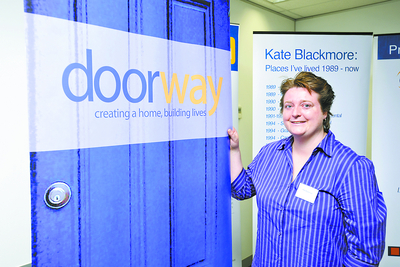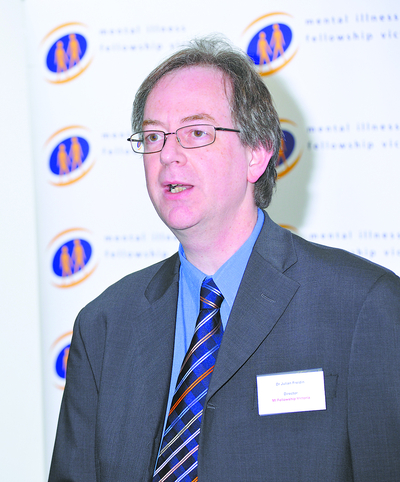DOORS are being opened to mental health sufferers in a bid to counter homelessness with a new pilot program, launched in Latrobe Valley today.
Mental Illness Fellowship Victoria has partnered with Latrobe Regional Hospital, private real estate industry and the Victorian Government in an effort to address homelessness among people with mental illness in the region.
The State Government has provided funding of $3.2 million over three years to subsidise the new Doorway housing and support pilot project which aims to provide private rental accommodation to 20 people with a mental illness in Latrobe City and the Baw Baw Shire.
“At least 42 per cent of people with serious mental illness are homeless or living in tenuous forms of housing, yet a stable home is crucial to managing mental health and preventing hospitalisation,” Doorway program coordinator for Gippsland Laura Kelly said.
Mental Illness Fellowship Victoria board director Dr Julian Freidin said the innovative program aimed at providing secure, safe housing for vulnerable people through integrated support services.
“A home is the key to having a life,” Dr Friedin said.
“It is crucial to have a place to call your own, where you are part of the community in normal housing, like everybody else… with integrated support services and all the opportunities to get a job and health cared for. What we are trying to do is create that environment where it will all happen.”
He said the correlation between homelessness and mental illness was a “complex interaction” and the program aimed to address these issues.
“Some key issues we have identified over the years is housing stability and understanding what the person’s own needs are and addressing those problems rather than imposing our thoughts on what they need for a life well lived,” Dr Friedin said.
Mental Illness Fellowship Victoria and LRH will provide ongoing support to tenants to assist them to maintain their health and build independence.
“Unless we deal with the issues the individual sees as important, they will never agree to engage in mental health treatment,” Dr Friendin said.
“The illness affects some very fundamental skills needed as a tenant, … and the more unwell you are the harder it is to go through the process.
The State Government funding will address the shortfall in meeting the cost of standard renting for individuals with mental illness .
Dr Friedin explained tenants would pay 30 per cent of their income towards the total rent and the program would provide the “top-up” and some basic furnishings.
“The aim is to help them into housing,” he said.
Participants will be referred into the program by the LRH mental health department.
“The Doorway program is building on the success of similar housing and support models which have been used overseas,” LRH mental health director Cayte Hoppner said.
“What is innovative about this particular program is the partnership between clinical services, community support services and the private real estate industry.”
State Member for Narracan Gary Blackwood said if successful, the program would serve as a model for future funding commitments and programs of a similar nature.
Mr Blackwood and State Member for Morwell Russell Northe had worked with Traralgon mental health advocates for the past five years to address issues of accommodation support in the region.
“The need is significant in the community and this will go a long way in assisting some of that need, but we still have to do more,” Mr Blackwood said.
Four Gippsland real estate agents are supporting the program and will work with property owners to match participants with properties.
Stockdale and Leggo Real Estate managing director Jim Demetrios said the Doorway program was offering property owners stable tenancies, hands-on tenancy support, financial incentives and the chance to help someone create a home.
“Often what people need is a foot up into the private rental market to get them on their way,” Mr Demtrios said.












